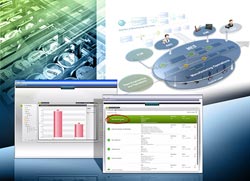Siemens adds Manufacturing Intelligence to Simatic IT MES

Simatic IT for Manufacturing Execution and Intelligence offers customers in the process, discrete and life sciences industries a completely new depth and quality of information from shop floor production data to top floor management level. The key benefits are faster and more targeted access to information such as production, quality assurance and maintenance data, because it is now available in a fully integrated system.
The MI accesses the Manufacturing Execution System (MES) database directly. The database contains real-time information from the production processes of one or more production plants, enabling companies to identify performance fluctuations quickly and to take the necessary remedial action efficiently.
Simatic IT for Manufacturing Execution and Intelligence brings together information from a wide range of data sources, even from more than one location. Visual representations of relevant information provide users at production, plant and management levels with the necessary decision-making resources for their area of responsibility.
Users at production and management level need meaningful information to support their optimisation processes. This includes data relating to orders, materials, plant capacity utilisation and production quality and costs. Role-based information that is easy to interpret forms the basis for making reliable, fast decisions, and is vital for making continuous improvements. To achieve this, Business Intelligence (BI) information needs to be combined with Manufacturing Intelligence (MI). Since BI solutions cannot be used at production level, companies have an interest in creating added value through the operational advantages of an MES system. Simatic IT achieves this added value by integrating the functions from the Manufacturing Execution and Manufacturing Intelligence systems. This facilitates communication between production and management level without the need for additional interfaces. Companies in all industries should benefit from this flexible, customizable, structured, role-based, industry-specific intelligence from production to management level.
Simatic IT for Manufacturing Execution and Intelligence brings together information from a wide range of data sources, even from more than one location. Users can create balanced scorecards with the help of industry-specific KPIs, set the parameters to be analysed, define the drill-down level of the information required and access tried and tested industry-specific libraries. Simatic IT for Manufacturing Execution and Intelligence records, structures and visualizes production, quality and maintenance data in one view in line with users’ specifications. Visual representations of relevant information provide users at production, plant and management levels with the necessary decision-making resources for their area of responsibility.
The information can be accessed centrally or remotely via a mobile device like a Microsoft Windows phone. Wherever users are located, they can call up scorecards, analyse faults and check production options.
Simatic IT for Manufacturing Execution and Intelligence bridges the gap between the different IT layers in production and management, thereby increasing the efficiency of a company’s production process and creating direct added value.
The Siemens Industry Sector (Erlangen, Germany) is the worldwide leading supplier of production, transportation, lighting and building technologies. With integrated automation technologies as well as comprehensive industry-specific solutions, Siemens increases the productivity, flexibility and efficiency of its customers in the fields of industry and infrastructure. The Sector includes six divisions: Building Technologies, Drive Technologies, Industry Automation, Industry Solutions, Mobility and Osram. By September 30, Siemens Industry had some 204,000 employees worldwide and turnover in fiscal year 2010 of €34.9 billion.http://www.siemens.com/industry
The Siemens Industry Automation Division (Nuremberg, Germany) is the worldwide leading supplier of automation technology, industrial switchgear and industry software. The offer ranges from standard products for the manufacturing and process industry up to industry specific solutions with the automation of complete automobile productions and chemical plants. As leading software supplier Industry Automation optimizes the whole value chain of producing companies – from product design and development through production and sales up to service. By September 30, Siemens Industry Automation had some 33.000 employees worldwide and a turnover in fiscal year 2010 of €6.2 billion. http://www.siemens.com/industryautomation
Reference Number: IIA2011032701e
Media Contact
More Information:
http://www.siemens.com/simatic-itAll latest news from the category: Machine Engineering
Machine engineering is one of Germany’s key industries. The importance of this segment has led to the creation of new university degree programs in fields such as production and logistics, process engineering, vehicle/automotive engineering, production engineering and aerospace engineering among others.
innovations-report offers informative reports and articles covering technologies such as automation, motion, power train, energy, conveyor, plastics, lightweight construction, logistics/warehousing, measurement systems, machine tools and control engineering.
Newest articles

NASA: Mystery of life’s handedness deepens
The mystery of why life uses molecules with specific orientations has deepened with a NASA-funded discovery that RNA — a key molecule thought to have potentially held the instructions for…

What are the effects of historic lithium mining on water quality?
Study reveals low levels of common contaminants but high levels of other elements in waters associated with an abandoned lithium mine. Lithium ore and mining waste from a historic lithium…

Quantum-inspired design boosts efficiency of heat-to-electricity conversion
Rice engineers take unconventional route to improving thermophotovoltaic systems. Researchers at Rice University have found a new way to improve a key element of thermophotovoltaic (TPV) systems, which convert heat…



